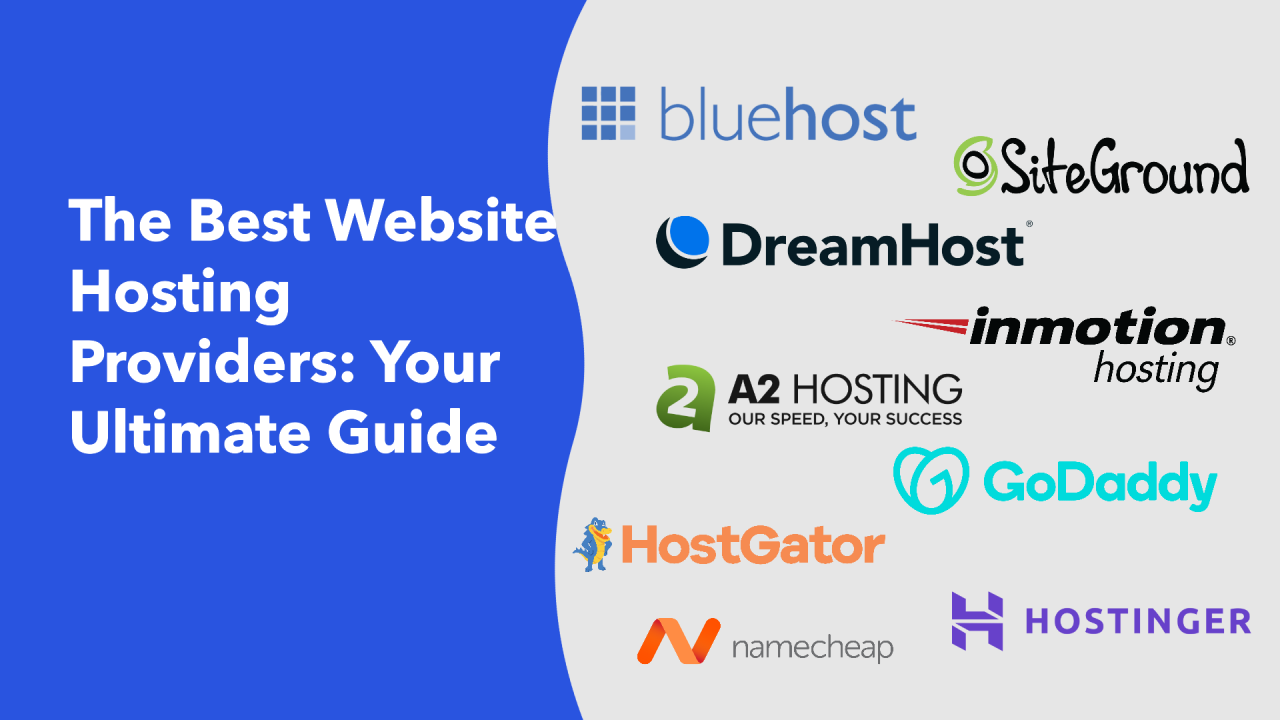Best Site for Hosting: Unlock Ultimate Performance
Finding the best site for hosting can be overwhelming. Many options promise great features.
It’s crucial to choose wisely, as hosting impacts your website’s performance and success. In today’s digital world, a reliable hosting service is essential. Your website’s speed, security, and uptime depend on it. With countless hosting providers available, making the right choice can be tough.
Each one offers different plans, features, and prices. Some focus on speed, while others emphasize security or customer support. Understanding your website’s needs is the first step. Whether you’re launching a personal blog or managing a business site, the right hosting can make a difference. This guide will help you navigate the hosting landscape. You’ll learn what to look for and how to choose the best site for hosting your website.

Credit: www.linkedin.com
Top Hosting Sites
Choosing the right hosting site is crucial for your website’s success. The web is full of options, making it hard to decide. To help, we’ve put together a list of top hosting sites. This guide covers both leading providers and emerging contenders in the hosting world.
Leading Providers
Some hosting sites have stood the test of time. They offer reliable service and quality support. Bluehost is one of them. Known for its ease of use and strong customer support. It is a favorite among beginners. HostGator is another popular choice. It offers affordable plans with unlimited storage. SiteGround is well-regarded for its fast and secure hosting solutions. It is often praised for excellent customer service.
Emerging Contenders
New players are also making waves in the hosting industry. GreenGeeks stands out with its eco-friendly hosting solutions. It combines performance with sustainability. A2 Hosting is gaining traction for its speed and reliability. It offers turbo servers that enhance loading times. FastComet is another rising star. It provides cloud hosting with 24/7 customer support. These emerging contenders offer fresh perspectives and competitive features.

Credit: www.geeksforgeeks.org
Factors For Choosing
Selecting the right hosting site depends on reliability, speed, and customer support. Consider pricing and scalability for future growth. User-friendly interfaces can ease management, ensuring smooth operations for beginners.
Choosing the best site for hosting involves careful consideration. Your website’s performance depends on it. Several factors play a crucial role. Speed, reliability, and customer support are key. Each of these influences your site’s success. Let’s explore these factors in detail.Speed And Reliability
Website speed impacts user experience and SEO. Slow sites frustrate visitors. They may leave before your page loads. Hosting services should guarantee fast speeds. Look for providers with a good track record. Reliable hosting ensures your site is always up. Downtime can harm your reputation. Choose hosts with strong uptime guarantees. This keeps your website accessible.Customer Support
Good customer support is essential. Technical issues can arise anytime. Fast, effective help can solve problems quickly. Look for hosting providers with 24/7 support. Check if they offer multiple contact options. Live chat, email, and phone support are ideal. Responsive support teams can save you time. They reduce stress when issues occur. Reliable support enhances your hosting experience.Performance Metrics
Choosing the right site for hosting requires understanding performance metrics. These metrics include speed, uptime, and reliability. A good host ensures fast loading times and stable service.
Understanding the performance metrics of a hosting site is crucial for anyone looking to establish a strong online presence. Performance affects user experience, search engine rankings, and ultimately your website’s success. Whether you’re running a small blog or a large e-commerce platform, the right hosting service can make a significant difference. Let’s dive into some key metrics you need to consider.Uptime Guarantees
Uptime is the amount of time your website is accessible to users over a given period. A hosting site with a high uptime guarantee ensures that your site is almost always available. Most top hosting providers promise an uptime of 99.9% or more. Imagine a potential customer trying to visit your site only to find it down. You risk losing that sale. Always review the hosting provider’s uptime history. Some offer compensation if their uptime falls below the promised percentage.Load Time Optimization
Load time is how fast your website’s pages load for visitors. Faster load times lead to better user experience and higher search engine rankings. Studies show that users tend to leave a website if it takes longer than three seconds to load. I once switched to a new hosting provider and immediately noticed faster load times. My site’s bounce rate dropped, and user engagement increased. Does your current host optimize for speed with features like caching and SSD storage? Performance metrics should be a top priority when choosing a hosting service. They directly impact how your site performs and how users interact with it. Ask yourself: Is your hosting provider delivering on these critical metrics?Pricing Models
Selecting the best site for hosting involves understanding different pricing models. These models include shared hosting, VPS, and dedicated servers. Each offers unique benefits, catering to varied needs and budgets.
Choosing the right hosting site can be a game-changer for your website, but understanding the pricing models is crucial. You don’t want to end up paying more than what you bargained for. Knowing how pricing works can help you make informed decisions and avoid any nasty surprises.Subscription Plans
Subscription plans are usually straightforward. Most hosting sites offer monthly or annual plans. Monthly plans provide flexibility, allowing you to switch or cancel anytime without long-term commitments. Annual plans, on the other hand, often come with discounts. This makes them attractive if you plan to stick with a hosting service for a while. But always check if the renewal rates are higher than the initial offer. I once subscribed to a hosting site for a year, only to find my renewal rate had doubled when it was time to renew. That taught me to always read the fine print.Hidden Costs
Hidden costs can sneak up on you if you’re not careful. Some hosting sites advertise low prices, but later charge extra for essential features. These can include backup services, email accounts, or even customer support. Imagine planning a budget based on the advertised price, only to find you need to pay more for basic functionalities. It’s like buying a car and discovering you need to pay extra for the tires! Always scrutinize what’s included in the package and what might cost extra. It’s worth asking, is the initial low price truly a bargain, or just a way to get you in the door? Understanding these elements ensures you get the best value for your money. So, next time you’re choosing a hosting site, remember to dive deep into the details. What might seem cheap initially could end up being more expensive in the long run.Security Features
Security stands as a top priority in web hosting. A strong hosting platform ensures your site’s safety. Protecting data from threats and hackers is crucial. Let’s explore key security features you should seek. These enhance your site’s defense.
Ssl Certificates
An SSL certificate encrypts data exchanged between the user and server. It keeps sensitive information safe from prying eyes. With SSL, your site gains trust. Users see the padlock icon in their browsers. This assures them their data is secure. Many hosting sites offer free SSL certificates. It’s a must-have feature for any website today.
Ddos Protection
DDoS attacks flood a site with traffic, causing downtime. This affects user experience and can harm your reputation. Effective DDoS protection blocks malicious traffic. It ensures your site remains accessible. A reliable host provides robust DDoS defenses. This keeps your site up and running smoothly. Protect your online presence with this vital feature.
Scalability Options
Choosing the best site for hosting means considering scalability options. These options help your website grow with increased traffic. Look for hosting plans that offer flexibility and easy upgrades.
Scalability is crucial when choosing the best site for hosting. Whether you’re running a personal blog or managing a business website, you want a platform that grows with your needs. Imagine the frustration of launching a new feature only to find your site can’t handle the traffic. That’s why understanding scalability options is key.Resource Allocation
Effective resource allocation can make or break your website’s performance. Hosting platforms that offer flexible plans allow you to adjust resources like bandwidth and storage effortlessly. For example, if your site suddenly receives a spike in visitors, you should be able to allocate more bandwidth without a hitch. Wouldn’t you prefer a site that lets you tailor resources to your needs? Look for hosting providers that give you control over CPU, RAM, and other crucial elements. This ensures your site maintains its speed and functionality as demand grows.Growth Potential
Growth potential is about forecasting your site’s future needs. A hosting provider should offer plans that accommodate your growth trajectory. You don’t want to switch hosts every time your site expands. Consider hosting platforms that offer tiered plans or auto-scaling options. These ensure your site can handle increased load automatically. As your audience grows, your hosting should seamlessly support new features and content without downtime. Have you thought about where your site will be in a year or two? Choose a host that’s ready for your next big move. A provider that offers easy upgrades and add-ons can be a game-changer in your online journey.User Experience
Choosing the best site for hosting is crucial for any website. The user experience plays a significant role in this decision. It affects how easily users can navigate and manage their site. A smooth user experience can save time and reduce frustration. It ensures that you can focus on creating quality content.
Ease Of Use
Ease of use is essential for a hosting site. A simple interface helps users find what they need quickly. Even beginners should navigate the dashboard with ease. Clear instructions and intuitive design enhance usability. This simplicity ensures that users spend less time on technical issues.
Customization Tools
Customization tools offer the freedom to tailor your site. They let users adjust themes, layouts, and features. A wide range of options allows for personal touch. Users can create a unique look that fits their brand. Easy-to-use tools make customization stress-free.
Comparing Hosting Types
Choosing the right hosting type is crucial for your website’s performance. Different hosting options cater to various needs. Understanding them helps make informed choices. Let’s explore key hosting types.
Shared Vs Dedicated
Shared hosting means multiple websites share one server. It’s cost-effective and great for beginners. Resources are split among users, affecting performance during peak times. Dedicated hosting offers a whole server for one site. It provides more control and better performance. It’s ideal for high-traffic websites. Dedicated hosting costs more but offers enhanced security.
Cloud Vs Vps
Cloud hosting uses multiple servers to balance load. It provides scalability, adapting to traffic spikes. Cloud hosting offers high uptime and reliability. It’s perfect for growing sites needing flexibility. VPS stands for Virtual Private Server. It shares a physical server but acts like a dedicated one. Users get their own resources, improving performance. VPS is cost-effective and suitable for medium-sized websites.

Credit: cybernews.com
Conclusion
Choosing the right hosting site is important. It impacts your website’s success. Consider your needs and budget. Look for reliable uptime and strong security. Also, customer support should be responsive and helpful. Compare different options carefully. Read user reviews and feedback.
Test their features if possible. A good hosting site boosts your website performance. It helps in reaching more visitors. Make an informed decision. This ensures your website runs smoothly. Your online presence depends on it. Happy hosting!
